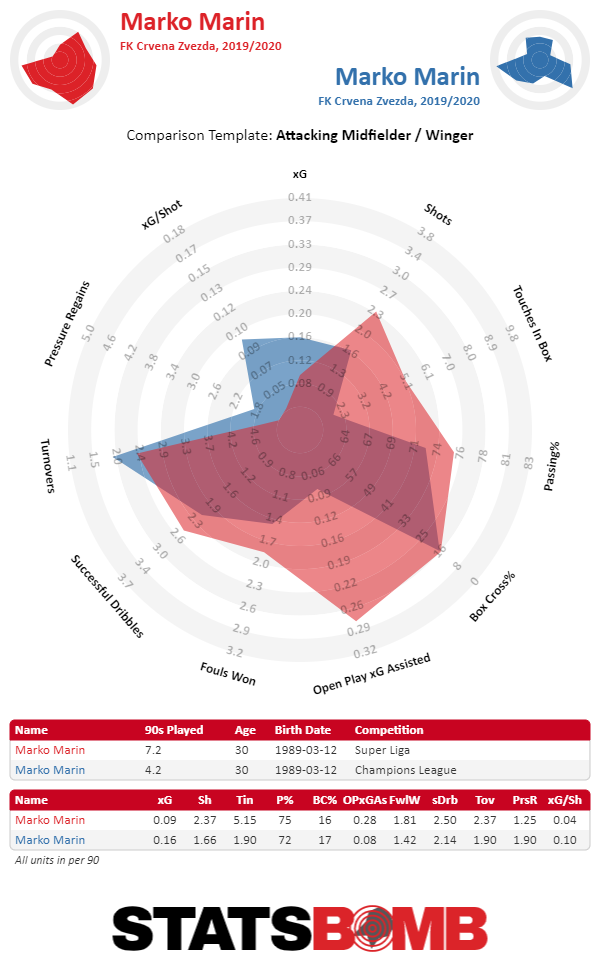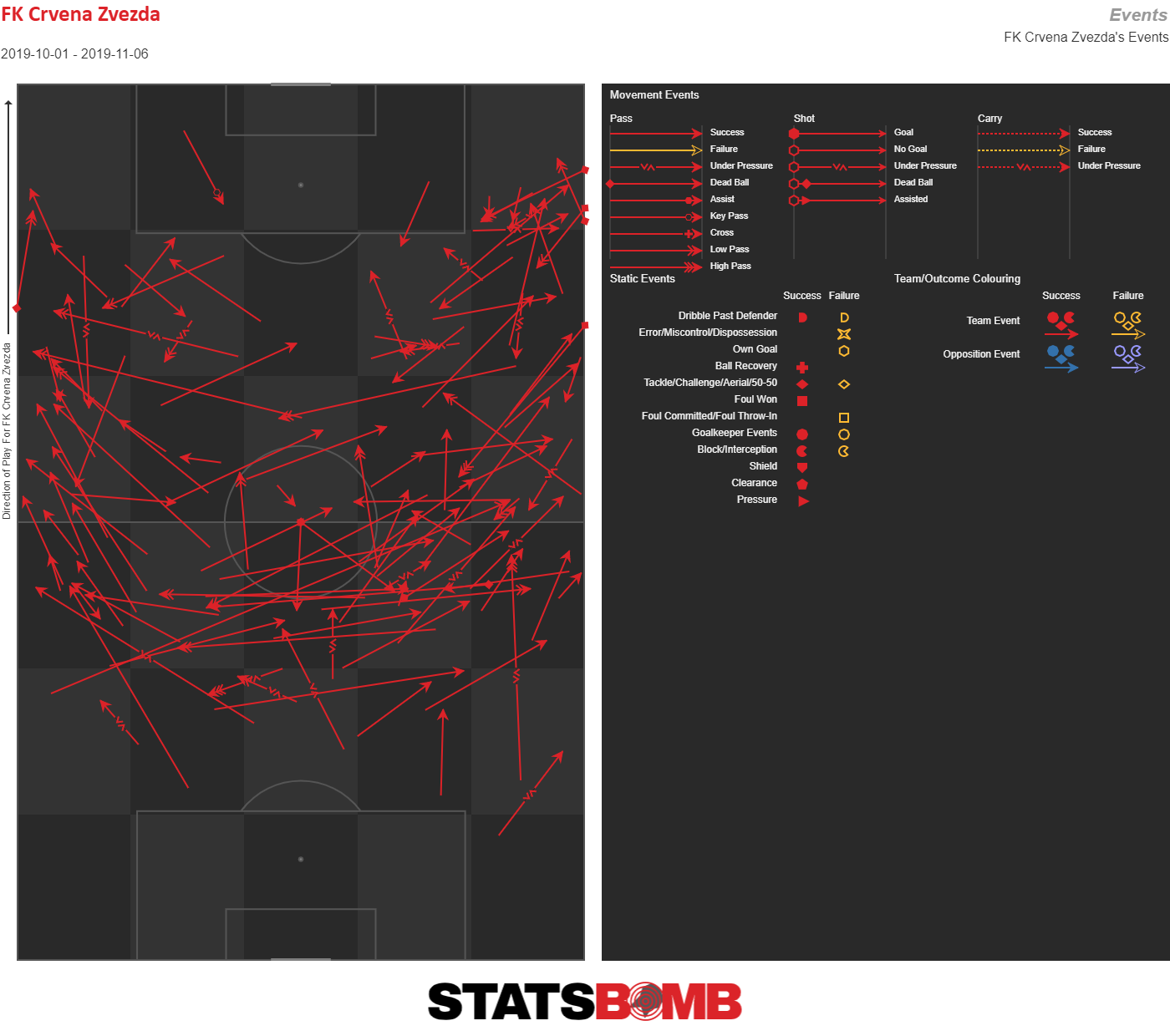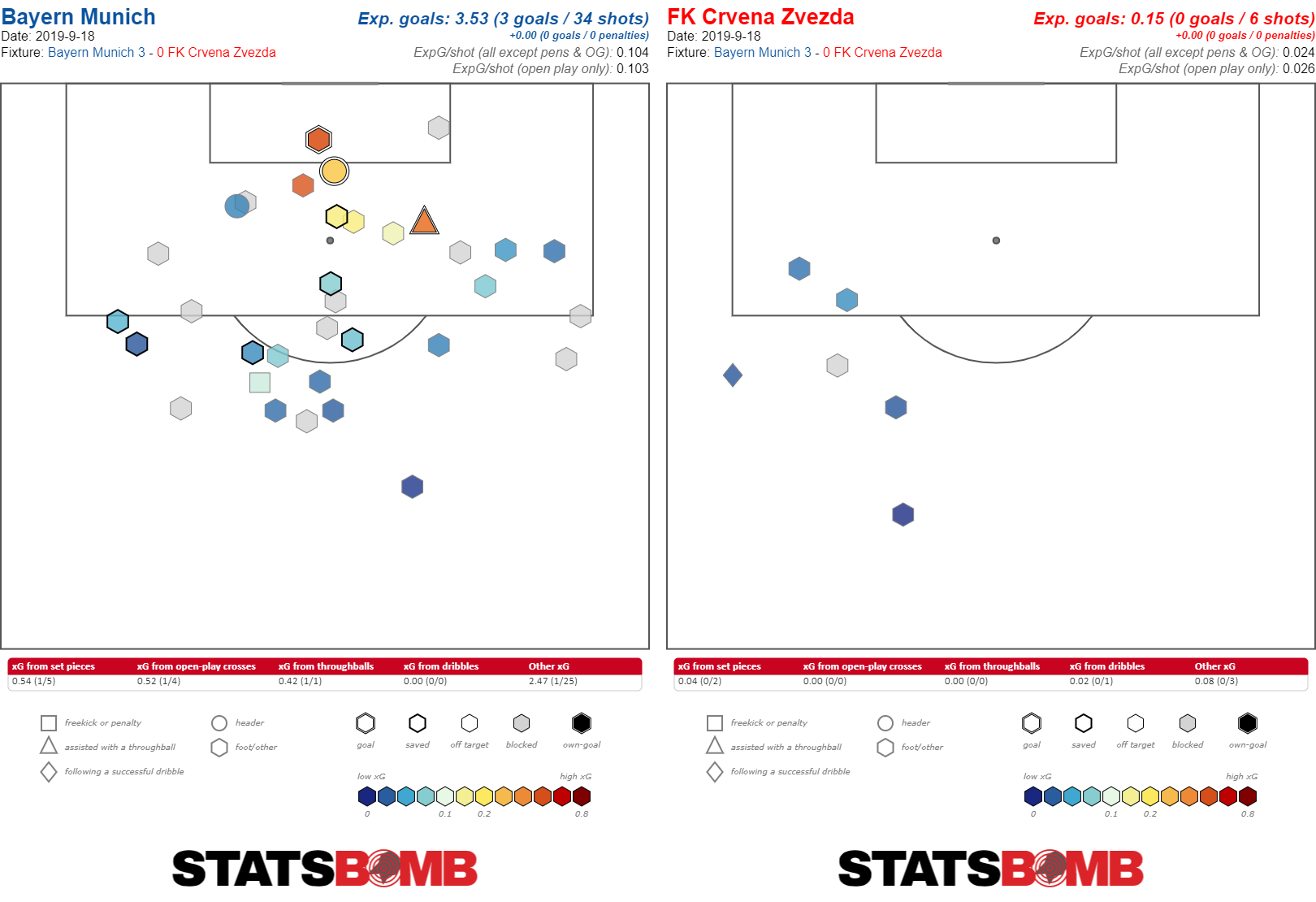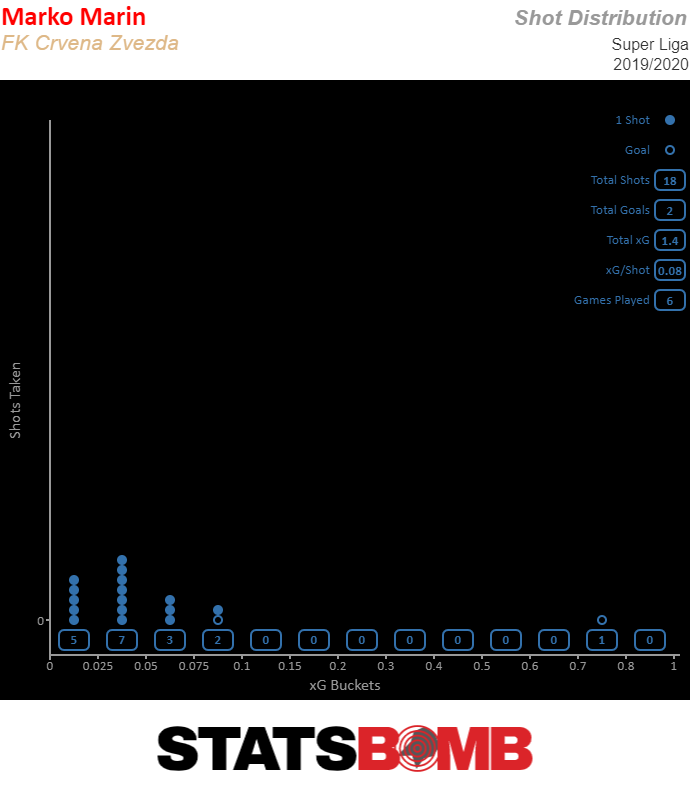Halftime of the second game of the Champions League group stages, and Red Star fans continued to chant back and forth to the visiting Olympiakos supporters, despite being down 1-0. Was it their friendship with the visiting Greek team that kept them singing, or were they drinking from a deep well of optimism, one unpoisoned from a 3-0 loss to Bayern Munich in the first round? It’s unlikely it was the latter, as Olympiakos appeared to control the play throughout the first half, fighting off few threats from the home team. But—as teams visiting the Marakana now know—the noise within the stadium can fluster even the best of teams, and despite the twinning of the teams, that noise may have thrown off Olympiakos when they returned to the field. But we have no stats for expected goals per decibel, so it’s better to focus on how much better Red Star looked when they returned to the pitch; how they looked like a team with a plan. That plan truly came together when midfielder Miloš Vulić entered in the 55th minute, replacing Dušan Jovančić, whose presence in the starting lineup remains a mystery we’ll circle back to. Olympiakos saw red in the 58th minute, and the second-yellow sendoff combined with the next-minute entrance of Richmond Boakye, replacing defensive midfielder José Cañas and putting two men up top,allowed them to turn the game around . The first goal came in the 62nd, the second in the 87th, and the third and final in extra time. Given the way substitutes Vulić and Boakye contributed to both the first and third goal, Red Star fans, in their more optimistic moments, like to think they’d have taken all three points either way. Points are rarely a worry for Red Star in the domestic league. Going into the fifth round of the group stage, they are seven points clear at the top of the table, with a game in hand. The difference? Marko Marin. The small attacking midfielder manages to stand head and shoulders above almost all others in the league, and Red Star as a squad is also a giant among ordinary men. The gap in talent between this club and the others in the league (save, perhaps, Partizan who despite trailing points in the table actually have a better expected goals difference) is similar to the gap in talent seen between Red Star and Tottenham in their back-to-back Champions League games. In domestic play, other sides have learned to focus on Marin, knowing if they are able to eliminate him as a threat, it’s far more difficult for Red Star to put on a good performance. Yet within the league, on a good day Marin has enough individual talent to shake off his minders, and if he can’t, the team as a whole may be a drag to watch, but the talent of others in the squad—including winger Ben, who is not registered for Champions League play—is sufficient to create chances without the sparkle of their magical Marin. In the Champions League, it’s a different matter. Other sides, familiar with Marin both from the various clubs he’s played at and seeing him in action last season, know to close him down. And when this occurs in the tournament, there’s simply no way the others have enough talent to find a way to create chances when Marin is prevented from getting the ball forward. The difference is stark.  This was particularly obvious in both games against Spurs, especially the first, in London, The Spurs midfield is much stronger than Red Star’s, and they were able to essentially eliminate the option of getting the ball to either Cañas or Vulić. As such, Marin had to continuously drop back, sometimes even behind the midfield, knowing the team was dependent on him to create something. Anything. Here are all the passes played to Marin during that match. He’s receiving the ball almost exclusively on the wings and in his own half.
This was particularly obvious in both games against Spurs, especially the first, in London, The Spurs midfield is much stronger than Red Star’s, and they were able to essentially eliminate the option of getting the ball to either Cañas or Vulić. As such, Marin had to continuously drop back, sometimes even behind the midfield, knowing the team was dependent on him to create something. Anything. Here are all the passes played to Marin during that match. He’s receiving the ball almost exclusively on the wings and in his own half.  Eventually he moved so far back he was left attempting to dribble out of his own defense, losing the ball and leading to the third goal for the home side, essentially closing out the game at the end of the first half. Going back to Bayern, the first time we saw Red Star in this year’s Champions League, we were looking at a team that was simply trying to survive. Vladan Milojević set up his side to sit deep, thinking they would perhaps have a chance on the counter, but rarely did such a chance come. One problem is that Red Star registered no right-back for the competition, opting to use Marko Gobeljić, a defensive midfielder, and not a good one at that. As for the left, Jander, a bench player, had to step in for Milan Rodić, who himself has looked out of touch all season, even playing domestically. It’s not a stretch to say the second goal was Jander’s fault. Meanwhile, the two holding midfielders, Cañas and Jovančić, could do nothing against the likes of Thiago. Remember when I said we’d circle back to Jovančić? It remains incomprehensible that Milojević continues to start him in the Champions League, particularly when he has Vulić available. He’s incredibly slow, loses the ball far too often, and attempts to dribble out of situations he has no chance of escaping. The only theory is that he’s tall, so he might win aerial duels . . . or that he’s blackmailing the coach with something juicy. The end result was Red Star neither preventing Bayern from creating good chances nor creating any of their own on the counter.
Eventually he moved so far back he was left attempting to dribble out of his own defense, losing the ball and leading to the third goal for the home side, essentially closing out the game at the end of the first half. Going back to Bayern, the first time we saw Red Star in this year’s Champions League, we were looking at a team that was simply trying to survive. Vladan Milojević set up his side to sit deep, thinking they would perhaps have a chance on the counter, but rarely did such a chance come. One problem is that Red Star registered no right-back for the competition, opting to use Marko Gobeljić, a defensive midfielder, and not a good one at that. As for the left, Jander, a bench player, had to step in for Milan Rodić, who himself has looked out of touch all season, even playing domestically. It’s not a stretch to say the second goal was Jander’s fault. Meanwhile, the two holding midfielders, Cañas and Jovančić, could do nothing against the likes of Thiago. Remember when I said we’d circle back to Jovančić? It remains incomprehensible that Milojević continues to start him in the Champions League, particularly when he has Vulić available. He’s incredibly slow, loses the ball far too often, and attempts to dribble out of situations he has no chance of escaping. The only theory is that he’s tall, so he might win aerial duels . . . or that he’s blackmailing the coach with something juicy. The end result was Red Star neither preventing Bayern from creating good chances nor creating any of their own on the counter.  Like against Spurs, Marin kept having to track back, as there was no one behind him able to get the ball into a decent position where the midfielder could create a chance. It’s not surprising, then, that he was the only player who had a chance against Bayern; his curving shot from the edge of the box just missed grabbing an equalizer for Red Star. For the rest of the game, in the rare times Red Star made it out of their own box, the ball went straight to Marin. Essentially, the entire burden of creating chances rested on his narrow shoulders. Given the 3-0 scoreline in the first fixture, and the cumulative 9-0 scoreline against Spurs, anyone who believes Red Star can beat Bayern at the Marakana is likely to be laughed at (but hey, you might win a decent chunk if you decide to bet that way). One positive is that Boakye is finally healthy, which in theory should help ease the pressure on Marin. However, Marko is one who likes to do things on his own; he seems to take it for granted that he’s far and away the best on the team, and so makes many failed attempts at goal when a better option would’ve been a pass. Marin’s creative numbers might be great, he has twice as many key passes (passes that lead directly to a shots) as anybody else on the side, the same is true for a fancier measure of creative output, xG assisted, but out of his 18 shots in league play only the penalty he’s taken has a value of over 0.10 xG.
Like against Spurs, Marin kept having to track back, as there was no one behind him able to get the ball into a decent position where the midfielder could create a chance. It’s not surprising, then, that he was the only player who had a chance against Bayern; his curving shot from the edge of the box just missed grabbing an equalizer for Red Star. For the rest of the game, in the rare times Red Star made it out of their own box, the ball went straight to Marin. Essentially, the entire burden of creating chances rested on his narrow shoulders. Given the 3-0 scoreline in the first fixture, and the cumulative 9-0 scoreline against Spurs, anyone who believes Red Star can beat Bayern at the Marakana is likely to be laughed at (but hey, you might win a decent chunk if you decide to bet that way). One positive is that Boakye is finally healthy, which in theory should help ease the pressure on Marin. However, Marko is one who likes to do things on his own; he seems to take it for granted that he’s far and away the best on the team, and so makes many failed attempts at goal when a better option would’ve been a pass. Marin’s creative numbers might be great, he has twice as many key passes (passes that lead directly to a shots) as anybody else on the side, the same is true for a fancier measure of creative output, xG assisted, but out of his 18 shots in league play only the penalty he’s taken has a value of over 0.10 xG.  What would be much more helpful is if Red Star had a stronger midfield overall, one experienced in taking on players, winning aerial duels, making successful tackles, and moving the ball forward. There are players who can certainly do one or two of those things, but there’s no one who can do more than one of these tasks consistently well. The best option would be starting Vulić from the start, even though he’s young and slow at times. The Olympiakos game showed that together he and Boakye can manage to string together enough for a goal, especially when Marin slips in, looking for an opportunity to create a chance.
What would be much more helpful is if Red Star had a stronger midfield overall, one experienced in taking on players, winning aerial duels, making successful tackles, and moving the ball forward. There are players who can certainly do one or two of those things, but there’s no one who can do more than one of these tasks consistently well. The best option would be starting Vulić from the start, even though he’s young and slow at times. The Olympiakos game showed that together he and Boakye can manage to string together enough for a goal, especially when Marin slips in, looking for an opportunity to create a chance.
2019
Marko Marin and the impossibility of Red Star's Champions League campaign
By admin
|
November 26, 2019